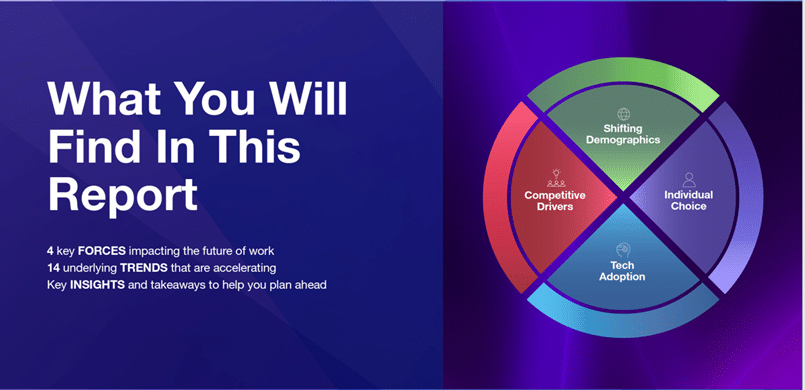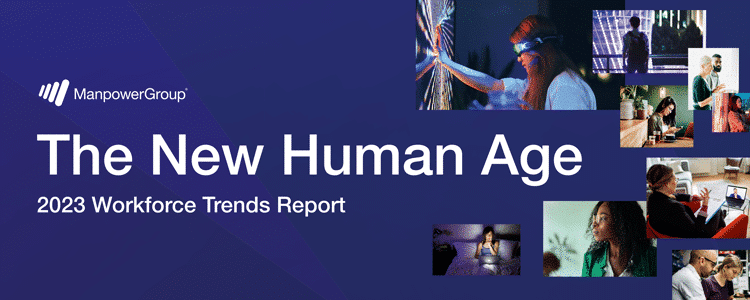ManpowerGroup’s 2023 Workforce Trends Report : “The New Human Age” Is Upon Us

Belgian employers plan to slow the hiring pace in Q1 2023, but continue to show resilience
5 January 2023
ManpowerGroup BeLux awarded the EcoVadis Gold Medal for the third time in a row for performance in sustainability and social responsibility
15 February 2023Shifting generational needs and growing demands for greater choice will be key drivers
in the race for talent
Amidst the growing digitization of work and the workforce, ManpowerGroup’s new 2023 trends report, “The New Human Age,” finds that although technology may be the great enabler, humans are still the catalyst to the future. This research, published ahead of the World Economic Forum Annual Meeting in Davos, Switzerland, which features input from 13,000 decision-makers and 8,000 workers from across eight countries and regions, identifies 14 key trends shaping the future of work and impacting today’s employers and the people they employ. These include shifting demographics, individual choice, tech adoption, and competitive drivers. The report also provides guidance on how employers can attract and retain talent in this new age.
Since ManpowerGroup’s announcement of the Human Age over a decade ago at the 2011 WEF Annual Meeting, human capital has become a major differentiator and driver of economic growth. Now, “The New Human Age” assesses the impact of a range of new factors, such as the generational shift in employment expectations, reducing college degree requirements for applicants, the growing divide women in the workforce face, the continuing evolution of hybrid work, and mitigating risk in an ever-changing global economy.
“Over the last few years, we’ve heard many concerns about robots taking our jobs. What we believed then, and has come to pass, is that tech can augment human skills. Now we are embarking on a New Human Age — a time where people are utilizing technology and digital tools to enhance human connections, be more productive, and live more meaningful lives,” said ManpowerGroup Chairman and CEO Jonas Prising. “Our world is getting better, yet to continue to make progress we must be intentional in accelerating human progress, working together to overcome division and reduce inequality. Equipping people with the skills to augment technology and create a future of work that is closer to what people want is how we will build a path for all and increase prosperity for the many, not the few.”
“In a context of talent shortage and uncertainty, the labour market is undergoing a major transformation driven by the four forces of the Human Age: demographics, changing individual choices, technological innovations and competitive drivers,” adds Sébastien Delfosse, Managing Director of ManpowerGroup BeLux. “All stakeholders in the labour market and in education, must take these trends into account to enable every person to be employable, to develop their skills and to build sustainable and fulfilling careers. ”
KEY FINDINGS: Growing talent shortages place even more pressure on attracting and retaining talent of every generation; the research found:
- Purpose and balance matter: By 2025, Gen Z will make up 27% of the workforce and 88% of Gen Z workers say the pandemic has affected what they want from their job vs. 65% of workers 55+.
- It’s time to tear the paper ceiling: In 2022, 75% of companies reported talent shortages. To expand their talent pools, more employers are reducing or eliminating college degree requirements and instead focusing on skills acquired through prior work and life experience.
- Look to older workers to increase workforce participation: Yet only 19% of hiring managers are actively looking to hire returning retirees, creating another disadvantage for older adults.
- Remote/hybrid work promotes balance but could affect career progression – with women most impacted: More women say when working remote they are less likely get access to time with senior leaders (37%), learning from others (31%), consideration for a promotion (29%), brainstorming (27%), and collaboration (26%).
- Women are more motivated than men about getting back to the office: 41% of women cite sociability / connection, clear segmentation between work / home, more efficient collaboration, ease of getting work done, and having a place to focus as factors leading their drive to return.
- Upskill workers or they will upskill themselves: 57% of employees are already pursuing training outside of work, because company training programs don’t teach them relevant skills, don’t advance their career development, or don’t help them stay competitive in the marketplace.
- Humans are seeking more humanity in a post-pandemic workplace: It’s not just about getting the job done. People say the ability to collaborate (83%), solve problems (82%), and be trustworthy (82%) are more important to do their job well than simply being a high producer (76%).
- People are voting with their feet: 64% of the workforce would consider looking for a new job if they were required to return to the office full-time and 1 in 3 would take another role in the next month if it offered a better blend of work and lifestyle.
- Both employers and workers believe in-person brainstorming is inherently better: More than 80% of workers and employers believe in-person collaboration generates the most creative ideas and drives camaraderie within the workplace.
About the Research
The research took place between Nov. 1-25, 2022, conducted among a total of 8,016 workers or people actively looking for work in eight countries and regions: the United States, the United Kingdom, France, Germany, Italy, Spain, Sweden, and Norway. In addition, ManpowerGroup surveyed 13,707 hiring decision-makers in these markets.
Report : The New Human Age
The 14 Workforce Trends of the NEW HUMAN AGE (Summary)







